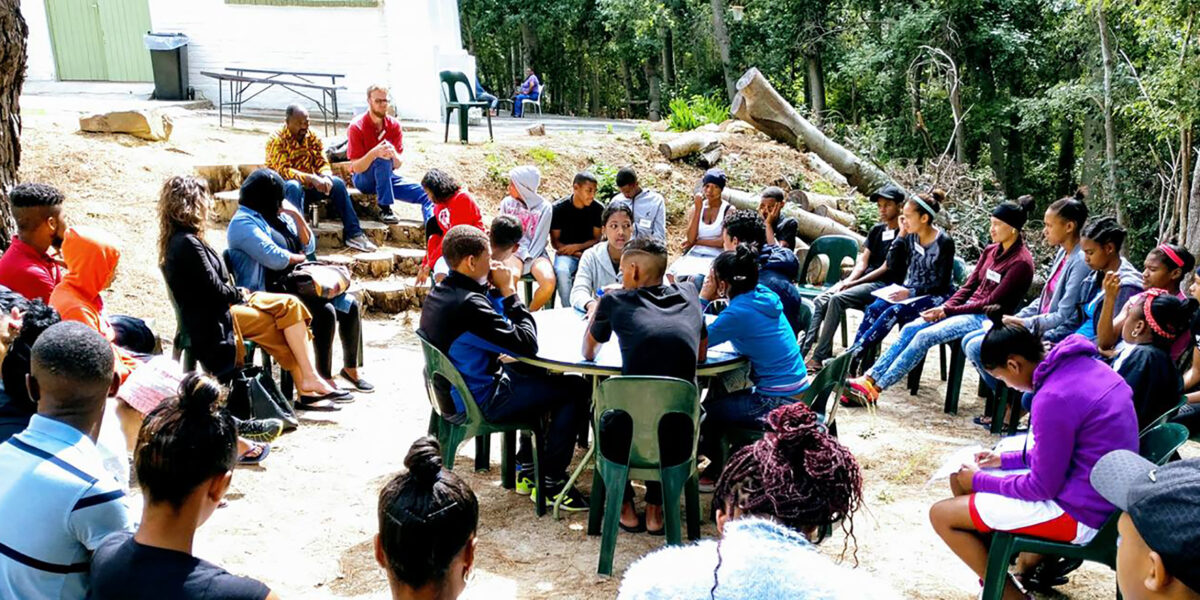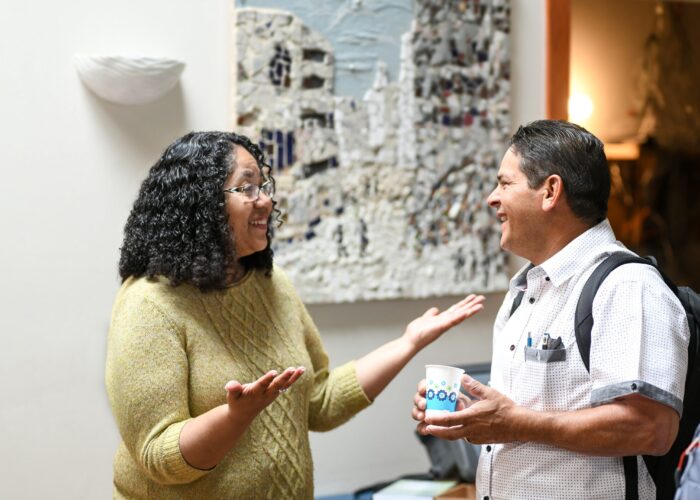Despite its majestic beauty, Table Mountain in Cape Town, South Africa, is not the mountain Isaiah sees with people streaming uphill and weapons of death being transformed into food-producing implements—at least not yet. In the shadow of Table Mountain, Oscar Siwali works toward Isaiah’s counter-cultural vision where those of different racial and ethnic groups move harmoniously toward a common goal. And Mennonite Mission Network has joined hands with him. For the past two years, Mission Network sent interns to work alongside and learn from Siwali by partnering with the organization he directs, Southern African Development and Reconstruction Agency (SADRA). Last year, Dan and Kathryn Smith Derksen committed to a longer term ministry promoting conflict transformation through SADRA.
Siwali said he founded the organization out of a "deep conviction that followers of Christ need to be active peacemakers in an increasingly violent world."
20 mediators in 20 communities by 2020
SADRA seeks to create violence-free communities and works toward this goal in multiple ways—through church renewal and leadership development, peace education in schools, active conflict transformation in communities, and election monitoring. They pay special attention to women’s contributions in all these areas.
The initiative to train "20 mediators in 20 communities by 2020" celebrated a milestone on May 20, when the first 31 high-school students received certification in the Peer Mediators program. These peer mediators learned about the roots of conflict and were equipped with skills and confidence to resolve intense situations through nonviolent means. Even before receiving certification, peer mediators in one school had already negotiated seven conflicts successfully!
The national and international communities in Cape Town acclaimed the success of the students. The master of ceremonies was Irvin Kinnes, a former advisor to South Africa’s police institutions and an expert in dealing with gang issues. The French Consulate provided the cake, and the Alliance Française (French Cultural Center) provided the venue.
Peace witnesses limit violence on campuses
In the fall of 2016, years of growing tension and regular protests by South African university students culminated in a series of institutional shut-downs. A university library burned. Buildings and equipment were damaged. Rubber bullets flew. Dissenters were arrested. Students were angry about rising school fees and a continuing curriculum promoting White privilege. Service staff joined the demonstrations after they lost contracts with benefits.
Siwali had seen the unrest coming and SADRA was ready. Dozens of volunteers from churches, civic organizations, and concerned parents had been trained.
"These protests [were] a microcosm of unrest in South Africa, due to disenfranchisement and distrust across race and class divides," Kathryn Smith Derksen said, as she and Dan joined others to serve as Peace Justice Witness observers.
The trained volunteers walked campuses and documented acts of violence, as militarized men in full riot gear broke down dorm doors, shot out windows, and otherwise terrorized students. Universities resembled war zones. Arrests were made without fair process. Trash was not collected for two months. Students with no money to return home were stranded on campus.
The SADRA volunteers noted that the "security" forces were mostly white-skinned, ex-military men with a history of abusing Black people under the apartheid system.
"The [security forces] seemed eager to intimidate students," Dan Smith Derksen said.

Kathryn Smith Derksen as Peace Justice Witness during a protest concert in Stellenbosch. Photo by Jacob Smith Derksen.
The Peace Justice Witnesses gave eye-witness reports to the media, organized garbage pick-ups, and invited pastors from Khayelitsha, a nearby Black township, to join the night-patrol teams. Students welcomed the pastors’ presence, and frequently turned to them for counseling. As mediators brought students and administrators together, a sense of calm returned. When the universities saw that the pastors were better at keeping order than the security forces, they dismissed the armed guards and decided to pay the pastors for ongoing prayer-walk patrols.
"The universities saved money on security while contributing to the livelihoods of their selfless neighbors," Kathryn Smith Derksen said. "In less than two weeks, the entire situation had turned from a coercive approach to a respectful one, from real fear to actual dialogue, from literal weapons to symbolic ploughshares. The outcome was beyond what we had all thought possible. But it’s not over."
"Jesus’ peace and love are for this moment in history"
SADRA has been invited to give conflict transformation workshops to student residence leaders in one of the four universities in the Cape Town area, and the Peer Mediators program continues in area schools. Church and community leaders are receiving training.
"As Mennonites, we believe the kingdom of God is now, and that the peace and love of Jesus are for this moment in history. We are called to work for peace, for societal transformation, wherever we are," Kathryn Smith Derksen said.
Mennonite Mission Network depends on those who share this belief and who generously share their gifts to make such ministries possible.
Gakeema Allie speaks out during peer mediation training, while (clockwise) Chadwin Andrews, Ferlan February, Fareid Jacobs, Kelly Winnaar, and Ryan Caswell practice listening skills. Photo by Dan Smith Derksen.





